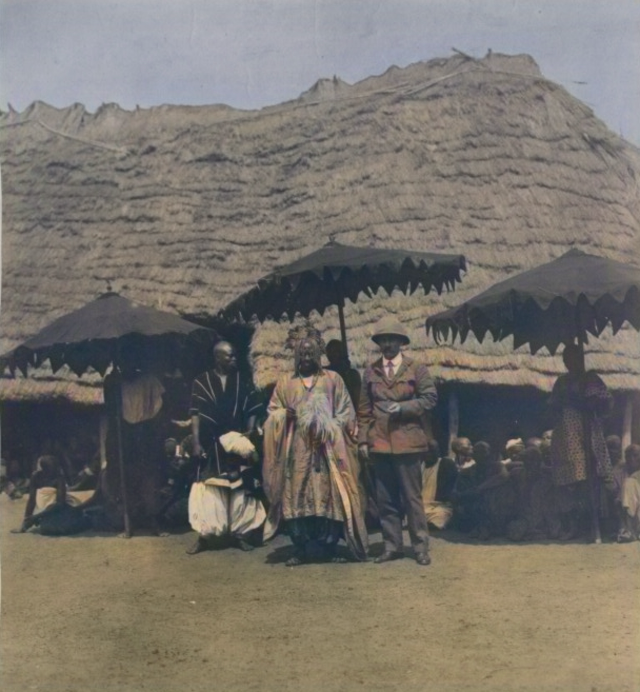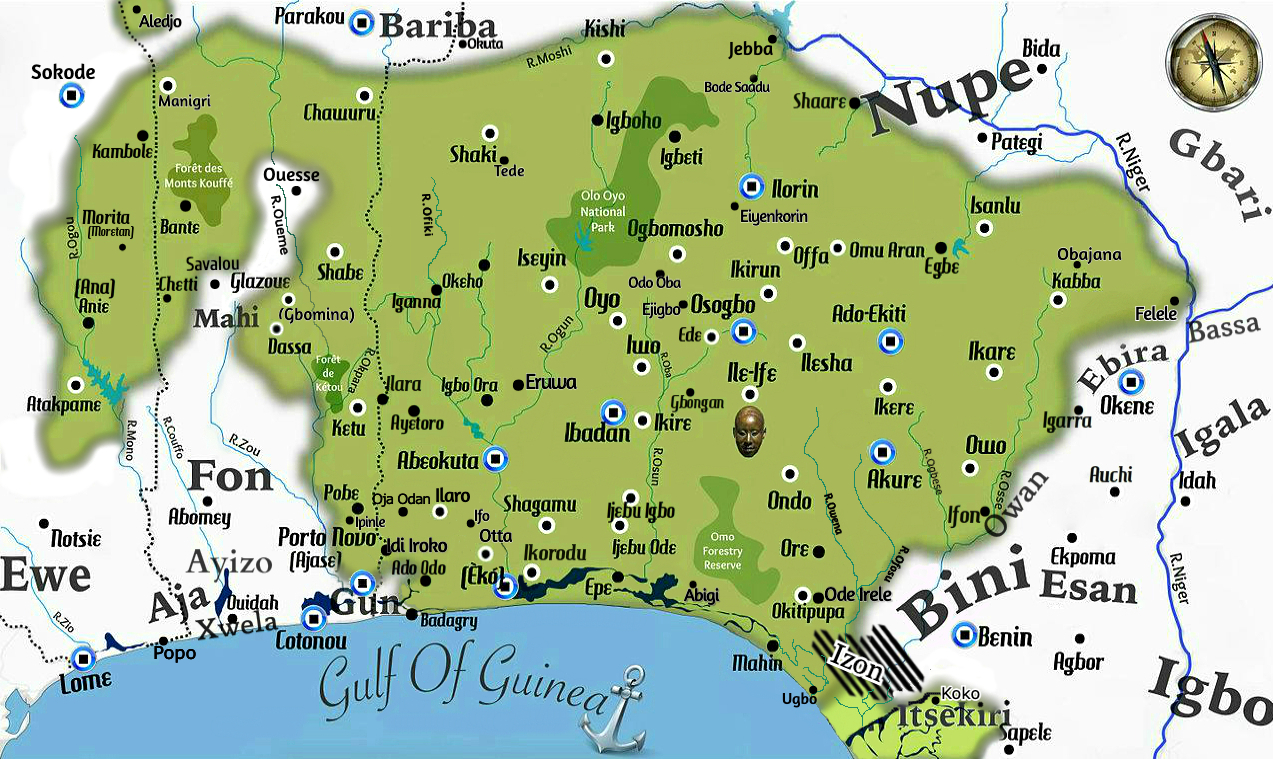|
Oluewu
Oluewu was the Alaafin (''emperor'') of the Oyo empire in northwestern Yorubaland, West Africa, from 1833-1835. Oluewu was then bound to Shita, the Emir of Ilorin. However, he refused to embrace the Islamic religion and sought help from Borgu to defeat the Fulani The Fula, Fulani, or Fulɓe people ( ff, Fulɓe, ; french: Peul, links=no; ha, Fulani or Hilani; pt, Fula, links=no; wo, Pël; bm, Fulaw) are one of the largest ethnic groups in the Sahel and West Africa, widely dispersed across the region. ...s. Initially, he recorded some success in battle, but a final putsch to recover the northern part of Yorubaland from the Fulanis led to his death by Okedare lanloke and that of many of Oyo's leading nobles. References Alaafins of Oyo 19th-century Nigerian people 19th-century rulers in Africa {{Alaafins of Oyo ... [...More Info...] [...Related Items...] OR: [Wikipedia] [Google] [Baidu] |
Alaafin
Alaafin, or ''The Owner of the Palace'' in the Yoruba language, is the title of the emperor of the medieval Oyo empire and present-day Oyo town of West Africa. He ruled the old Oyo Empire which extended from the present day Benin republic to Nigeria originating from states in the South East and West to the North. The people under him are called Yoruba people and spoke the Yoruba Language. The Alaafin of Oyo in Yoruba mythology and history is said to be one of Oduduwa seven grandsons who later became Kings, forming the bedrock of the Yoruba Civilization /sup> . The title was retained after the fall of the Oyo Empire as the official title of the ceremonial ruler of the contemporary natives of Oyo, Nigeria. The Alaafin is the political head of the Yoruba people and the only monarch with the pre-requisite power to appoint a chieftain representing the entire Yorubaland Yorubaland () is the homeland and cultural region of the Yoruba people in West Africa. It spans the modern-d ... [...More Info...] [...Related Items...] OR: [Wikipedia] [Google] [Baidu] |
Oyo Empire
The Oyo Empire was a powerful Yoruba empire of West Africa made up of parts of present-day eastern Benin and western Nigeria (including Southwest zone and the western half of Northcentral zone). It grew to become the largest Yoruba language, Yoruba-speaking state and rose through the outstanding organizational and administrative skills of the Yoruba people, wealth gained from trade, and a powerful cavalry. The Oyo State, Oyo Empire was one of the most politically important states in the entirety of Western Africa from the mid-17th to the late 18th century, and held sway not only over most of the other kingdoms in Yorubaland, but also over nearby African states, notably the Fon people, Fon Kingdom of Dahomey in the modern Republic of Benin on its west. History Legend of origin The origins of the Oyo Empire lie with Oranyan (also known as Oranmiyan), the last prince of the Yoruba Kingdom of Ile-Ife (Ife). Oranmiyan made an agreement with his brother to launch a punitive raid o ... [...More Info...] [...Related Items...] OR: [Wikipedia] [Google] [Baidu] |
Yorubaland
Yorubaland () is the homeland and cultural region of the Yoruba people in West Africa. It spans the modern-day countries of Nigeria, Togo and Benin, and covers a total land area of 142,114 km2 or about 60% of the land area of Ghana. Of this land area, 106,016 km2 (74.6%) lies within Nigeria, 18.9% in Benin, and the remaining 6.5% is in Togo. Prior to European colonization of the Americas, European colonization, a portion of this area was known as Yoruba country. The geo-cultural space contains an estimated 55 million people, the majority of this population being ethnic Yoruba people, Yorubas. Geography Geo-physically, Yorubaland spreads north from the Gulf of Guinea and west from the Niger River into Benin and Togo. In the northern section, Yorubaland begins in the suburbs just west of Lokoja and continues unbroken up to the Ogooué River tributary of the Mono River in Togo, a distance of around 610 km. In the south, it begins in an area just west of the Benin and ... [...More Info...] [...Related Items...] OR: [Wikipedia] [Google] [Baidu] |
Islamic Religion
Islam (; ar, ۘالِإسلَام, , ) is an Abrahamic monotheistic religion centred primarily around the Quran, a religious text considered by Muslims to be the direct word of God (or ''Allah'') as it was revealed to Muhammad, the main and final Islamic prophet.Peters, F. E. 2009. "Allāh." In , edited by J. L. Esposito. Oxford: Oxford University Press. . (See alsoquick reference) " e Muslims' understanding of Allāh is based...on the Qurʿān's public witness. Allāh is Unique, the Creator, Sovereign, and Judge of mankind. It is Allāh who directs the universe through his direct action on nature and who has guided human history through his prophets, Abraham, with whom he made his covenant, Moses/Moosa, Jesus/Eesa, and Muḥammad, through all of whom he founded his chosen communities, the 'Peoples of the Book.'" It is the world's second-largest religion behind Christianity, with its followers ranging between 1-1.8 billion globally, or around a quarter of the world's pop ... [...More Info...] [...Related Items...] OR: [Wikipedia] [Google] [Baidu] |
Borgu
Borgu is a region in north-west Nigeria and in the northern Republic of Benin. It was partitioned between Great Britain and France by the Anglo-French Convention of 1898. People of Borgu are known as Bariba or Borgawa. History According to the Kisra legend known all over Borgu, the petty kingdoms of the country were founded by Kisra, a hero who according to an oral tradition immigrated from Birnin Kisra ("the town of Kisra") in Arabia. His brothers are said to have been the founders of the kingdoms of Illo, Bussa and Nikki. Other descendants are believed to have constituted the ruling aristocracy of the Wasangari. Colonial era During the British colonial era, the area was within the territory claimed by the Royal Niger Company, but rivalry between Britain and France for control of the trade on the River Niger led to occupation of areas by the French, for instance at Illo, and the stationing of the British West African Frontier Force at Yashikera and elsewhere in the region.A ... [...More Info...] [...Related Items...] OR: [Wikipedia] [Google] [Baidu] |
Fulani
The Fula, Fulani, or Fulɓe people ( ff, Fulɓe, ; french: Peul, links=no; ha, Fulani or Hilani; pt, Fula, links=no; wo, Pël; bm, Fulaw) are one of the largest ethnic groups in the Sahel and West Africa, widely dispersed across the region. Inhabiting many countries, they live mainly in West Africa and northern parts of Central Africa, South Sudan, Darfur, and regions near the Red Sea coast in Sudan. The approximate number of Fula people is unknown due to clashing definitions regarding Fula ethnicity. Various estimates put the figure between 25 and 40 million people worldwide. A significant proportion of the Fula – a third, or an estimated 12 to 13 million – are pastoralists, and their ethnic group has the largest nomadic pastoral community in the world., Quote: The Fulani form the largest pastoral nomadic group in the world. The Bororo'en are noted for the size of their cattle herds. In addition to fully nomadic groups, however, there are also semisedentary Fulani —F ... [...More Info...] [...Related Items...] OR: [Wikipedia] [Google] [Baidu] |
19th-century Nigerian People
The 19th (nineteenth) century began on 1 January 1801 ( MDCCCI), and ended on 31 December 1900 ( MCM). The 19th century was the ninth century of the 2nd millennium. The 19th century was characterized by vast social upheaval. Slavery was abolished in much of Europe and the Americas. The First Industrial Revolution, though it began in the late 18th century, expanding beyond its British homeland for the first time during this century, particularly remaking the economies and societies of the Low Countries, the Rhineland, Northern Italy, and the Northeastern United States. A few decades later, the Second Industrial Revolution led to ever more massive urbanization and much higher levels of productivity, profit, and prosperity, a pattern that continued into the 20th century. The Islamic gunpowder empires fell into decline and European imperialism brought much of South Asia, Southeast Asia, and almost all of Africa under colonial rule. It was also marked by the collapse of the large ... [...More Info...] [...Related Items...] OR: [Wikipedia] [Google] [Baidu] |



.jpg)


